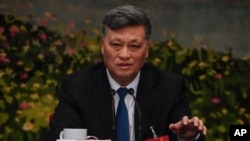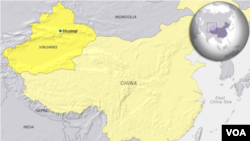Exiled members of China’s Uyghur minority group accuse Beijing of human rights violations and say the Communist Party chief in the Xinjiang region where most of them are from has been more heavy-handed in his approach toward them than his predecessor.
Members of the largely Turkic Muslim minority group said they had hoped Ma Xingrui, with his technocratic background, might moderate the region’s hardline stance, but three years into his current position, observers said the opposite is happening in the Xinjiang Uyghur Autonomous Region in northwest China.
“Under Ma’s watch, arbitrary detentions have persisted, and forced labor has expanded, especially in Belt and Road projects,” said Abduweli Ayup, a Norway-based Uyghur activist. China’s Belt and Road Initiative is a global infrastructure and trade endeavor that has lasted for more than 10 years.
Ayup also said that under Ma, 240 Uyghurs who sought refuge in cities such as Shanghai and Beijing were forced to return to Xinjiang.
“These individuals were arrested and forcibly returned to Xinjiang, where their fates remain uncertain,” Ayup told VOA, citing information from trusted sources from China.
Obtaining and verifying information from inside China has been challenging due to the government's tight control over communications and the people’s fear of repercussions for disclosing sensitive details.
Despite the risks, Uyghurs from within and outside of China rely on discreet networks and encrypted messaging to get the word out, often at great peril, according to Ayup and other exiles.
Activists said they notice during Ma’s tenure, he has not only upheld but intensified the internment of over 1 million Uyghurs, turning temporary detentions into long-term imprisonments.
The United States and Canada have accused China of genocide. The European Union and rights organizations have condemned China’s policies against the Uyghurs and described Beijing’s approach as crimes against humanity.
Chinese authorities deny allegations of repression in Xinjiang, framing their policies as efforts to combat “terrorism, extremism and separatism.”
“China is a law-based country. Judicial departments handle cases in accordance with law,” Liu Pengyu, spokesperson for the Chinese Embassy in Washington, wrote in a response to a VOA request for comment.
Repression extends beyond Xinjiang
Observers said Beijing’s narrative sharply contradicts firsthand accounts and international reports that accuse China of human rights abuses, including mass detentions and cultural erasure.
Some Uyghurs have tried to move out of Xinjiang and away from the scrutiny of Chinese officials within the region. But the crackdown has spilled beyond Xinjiang’s borders, targeting Uyghurs in other parts of China, Ayup said.
One such case involves Irpan Yarmemet, a Uyghur content producer who was arrested in Shanghai in September for traveling to Turkey eight years ago to study. Ayup said Yarmemet was living in Shanghai for fear of arbitrary detention in Xinjiang. After his arrest, he was detained in Xinjiang. It is unknown whether he is charged or convicted of a crime.
“His hopes of staying safe by avoiding Xinjiang were dashed,” Ayup said. “The recent arrests and forced returns show that the crackdown under Ma Xingrui has no geographical boundaries.”
The human cost
Uyghur exile Madina Mehmet, now living in the Netherlands, said leaving China was a matter of survival.
In 2012, she enrolled at Beijing Foreign Studies University but was forced out after just a year.
“They kept pressuring me to remove my headscarf,” Mehmet said. “They wouldn’t let me live in peace. I couldn’t take it anymore.”
She eventually secured a university scholarship in Turkey, where she lived and studied for eight years. She then moved to the Netherlands. However, Beijing’s reach continued to haunt her.
“While I was in Turkey, Chinese officials demanded proof that I was a student there,” she said. “Even now, they interrogate my mother in Urumqi, asking for my address and details about my life in the Netherlands.” Urumqi is Xinjiang’s capital.
Mehmet said her relatives have also been scrutinized for their travels. She said almost a decade ago, her sister, Mihray Mehmet, cousin and aunt had either studied or traveled to Egypt, Saudi Arabia and Turkey, all countries Beijing has deemed sensitive.
In late 2021, Madina Mehmet said, the three women were detained in Urumqi. They were falsely accused of being “connected to terrorist organizations,” said Mehmet.
Rights groups reported that Uyghurs who had visited a sensitive country prior to 2017 would be scrutinized for possible arrests and interrogations.
“My sister was an exceptional student,” Mehmet said of her sister, who was attending Xinjiang Medical University when her academic aspirations were derailed by state harassment over her headscarf.
“Teachers humiliated her by forcibly removing it in front of her classmates,” Mehmet said. Mihray Mehmet eventually left university to study in Egypt — a decision later used to justify her detention.
VOA asked the Chinese Embassy in Washington about Mihray Mehmet’s case, and Liu responded by saying, “I have not heard about the case you mentioned.”
Last year, Madina Mehmet’s aunt was released from detention, but her sister and cousin were sentenced to at least seven years in prison.
“They’ve committed no crime,” Mehmet told VOA. “My sister’s children — just 3 and 5 years old when she was arrested — are growing up without their mother.”
Despite the risks of speaking out, Madina Mehmet refuses to stay silent.
“I want the Chinese government to release my sister and cousin,” she said. “They deserve to be free, to raise their children, to live without fear.”
Targeting prominent Uyghurs
Rehmutulla Semet, the vice chair of the Chamber of Commerce and Industry of Xinjiang and a prominent real estate developer, was also a target of China’s Xinjing policies. He was sentenced to 19 years in prison in 2021 on charges of “assisting terrorist activities” and “gathering a crowd to disrupt public order,” according to a source who requested anonymity out of fear of reprisal.
Sources close to Semet fear retaliation and request not to be revealed but told VOA the charges are false. They said he was targeted due to his ethnicity, social status and wealth.
Since Ma’s arrival in Xinjiang, Semet’s assets, valued at more than $400 million, have been seized. Some of his assets were auctioned off on platforms such as Douyin, China’s domestic version of TikTok.
“One of his signature buildings, the Gold Coin Hill Building, a high-rise in Urumqi, was among those auctioned off,” a source told VOA. “He owned similar buildings in other major cities in the region, all of which were officially confiscated by the government this past August.”
Ayup said such prosecutions are part of a broader pattern of stripping influential Uyghurs of their wealth and silencing dissent.
Mehmet and Ayup are part of a growing number of Uyghur exiles who are calling for international accountability and action.
“The world must act — justice for Uyghurs is long overdue,” Mehmet said.





